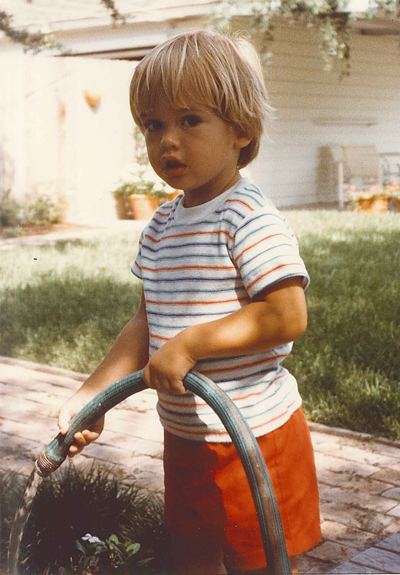We love the rain, but so do the skeeters. We have everything you need to repel and kill them. Mosquito Beater Liquid Hose-end can be sprayed across the lawn, shrubs and anywhere else they may hide. We also have Mosquito Dunks and Mosquito Bits for standing water in birdbaths, saucers, puddles or even old tires to kill their larvae organically. We have Mosquito Beater Granules which are essential plant oils on a flake to repel them. It is Lemon grass oil, Citronella oil, Garlic, Geranium oil and Cedar oil, so it smells really nice. And don’t forget our Skeeter Eggs that you hang on the porch or patio. They hold Citronella oil in a porous egg to repel for 200 sq. ft. Having a party or just want to enjoy the cool evenings outdoors. Come see us and we will get you what you need.
 -DeAnna
-DeAnna
 -Debbie
-Debbie Some of you remember Stuart as an infant in his baby carrier, plopped on the sales counter at our Airline store while I ran the cash register. Some of you remember his working in your garden or helping you select your Christmas tree or coming to your home with James on a house call. We laugh out loud when we recall Stuart, around 10 at the time, diagnosing chinch bugs in a customer’s yard. He clearly was paying attention to his dad. And then there was the time, at about the same age, when he suggested that we start staying open 24 hours a day, allowing inventory to be stocked while customers were asleep! We haven’t implemented his system, but we recognize it has merit. As a young boy, Stuart travelled with us on tours of plant growers around Texas. James, Stuart and I would jump in the grower’s vehicle and drive the fields, trying to find the best plants for our garden center. James and I devised a system for grading plants, A+ being the best to F being the worst, all recorded on paper, but never revealed to our salesperson. On one of these trips, Stuart announced to the group that he thought the dwarf pittosporum was a C grade. We covered up his comment as best we could, but laughed later. Bottom line, Stuart lived Gill Landscape Nursery from a very early age.
Some of you remember Stuart as an infant in his baby carrier, plopped on the sales counter at our Airline store while I ran the cash register. Some of you remember his working in your garden or helping you select your Christmas tree or coming to your home with James on a house call. We laugh out loud when we recall Stuart, around 10 at the time, diagnosing chinch bugs in a customer’s yard. He clearly was paying attention to his dad. And then there was the time, at about the same age, when he suggested that we start staying open 24 hours a day, allowing inventory to be stocked while customers were asleep! We haven’t implemented his system, but we recognize it has merit. As a young boy, Stuart travelled with us on tours of plant growers around Texas. James, Stuart and I would jump in the grower’s vehicle and drive the fields, trying to find the best plants for our garden center. James and I devised a system for grading plants, A+ being the best to F being the worst, all recorded on paper, but never revealed to our salesperson. On one of these trips, Stuart announced to the group that he thought the dwarf pittosporum was a C grade. We covered up his comment as best we could, but laughed later. Bottom line, Stuart lived Gill Landscape Nursery from a very early age. Stuart packed his bags and moved to Seattle. He started working in the landscape industry,
Stuart packed his bags and moved to Seattle. He started working in the landscape industry, One more thing… Anne and Stuart are doing a bike tour of Indonesia for their honeymoon. Happy, Happy!
One more thing… Anne and Stuart are doing a bike tour of Indonesia for their honeymoon. Happy, Happy! 
